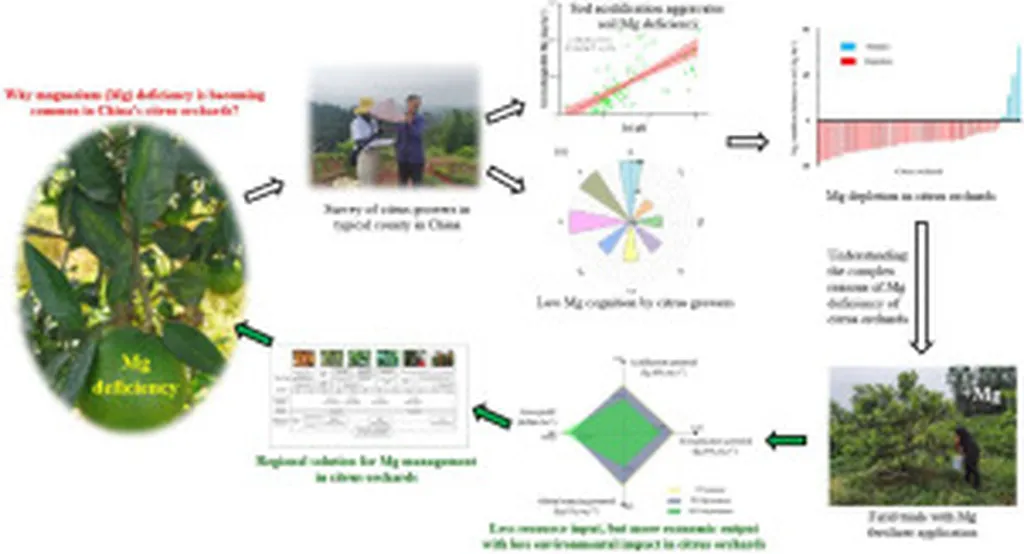In the heart of China’s citrus-growing regions, a silent crisis is brewing beneath the trees. As soil acidity increases, magnesium (Mg) is leaching away, threatening the very foundation of citrus production. A recent study led by Yuheng Wang from the College of Resources and Environment at Southwest University has shed light on this pressing issue, offering insights that could reshape agricultural practices in subtropical and tropical zones.
The study, published in the *Journal of Integrative Agriculture* (translated as “综合农业学报”), reveals that magnesium deficiency is becoming a significant limiting factor for citrus production. Over two years, Wang and his team conducted a field experiment in a typical citrus orchard, applying varying levels of magnesium fertilizer. The results were striking: magnesium application increased citrus fruit yield by 4.1% to 16.4% compared to plots where no magnesium fertilizer was added.
“Magnesium leaching and its imbalance may be a major cause of yield decline,” Wang explained. “Our findings highlight the urgent need for targeted magnesium management strategies in citrus orchards.”
The research quantified soil magnesium leaching, finding that without magnesium fertilizer, the average leaching was 65.7 kg per hectare per year. This figure rose to 91.3 kg per hectare per year when magnesium oxide (MgO) was applied at a rate of 180 kg per hectare. Over the four treatments, magnesium leaching accounted for 12.1% to 42.4% of the applied magnesium fertilizer.
The study also revealed that magnesium leaching and its removal through harvested fruits resulted in a negative soil magnesium balance in all treatments except the highest magnesium application rate. The pH values of leachate from the acid soil were alkaline and contained higher amounts of calcium and potassium than magnesium.
These findings have significant commercial implications for the agricultural sector. As soil acidity increases due to environmental factors and intensive farming practices, the leaching of essential nutrients like magnesium can lead to substantial yield losses. For citrus producers, this means potential economic losses and reduced fruit quality.
The research underscores the importance of applying magnesium fertilizer or Mg-fortified soil conditioners to sustain soil magnesium balance, high fruit yield, and fruit quality. This approach could be a game-changer for citrus producers in humid subtropical regions, helping them maintain productivity and profitability in the face of changing soil conditions.
As the agricultural industry grapples with the challenges of climate change and soil degradation, studies like Wang’s provide crucial insights into sustainable farming practices. By addressing magnesium deficiency, farmers can ensure the long-term health and productivity of their orchards, securing a stable food supply and economic stability for rural communities.
The study’s findings are a call to action for the agricultural sector to prioritize soil nutrient management. As Wang noted, “Considering the high leaching of magnesium from the acid soils of citrus orchards, applications of magnesium fertilizer or Mg-fortified soil conditioner are vital to sustain soil magnesium balance, high fruit yield, and fruit quality in citrus production systems in humid subtropical regions.”
In the quest for sustainable agriculture, this research offers a beacon of hope, guiding farmers and policymakers toward practices that can mitigate the impacts of soil acidity and ensure the future of citrus production.

